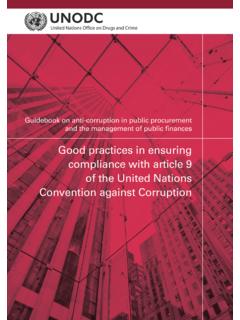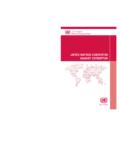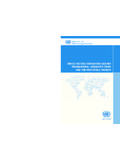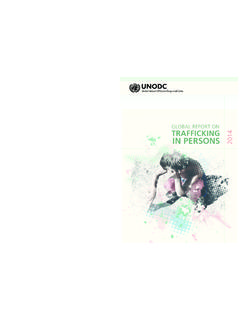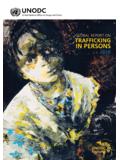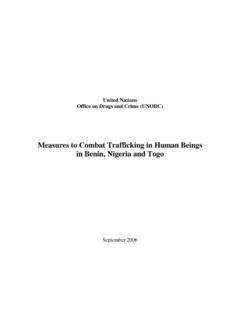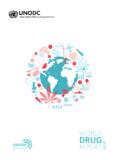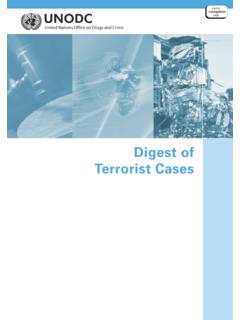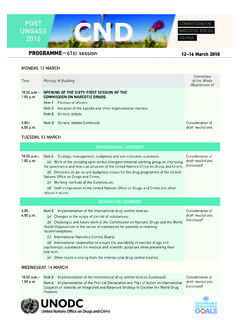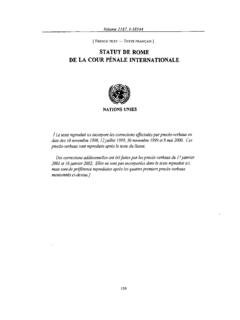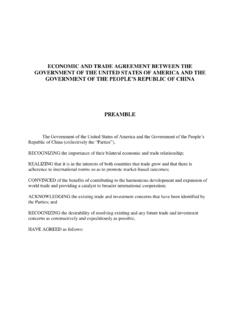Transcription of The use of the Internet for terrorist purposes
1 The use of the Internet for terrorist purposesIn collaboration with the united nations CoUnTer-TerrorIsm ImplemenTaTIon Task ForCeUNITED nations office ON DRUGS AND CRIMEV iennaTHE USE OF THE Internet FOR terrorist PURPOSESU nited nationsnew York, 2012 united nations , September 2012. All rights designations employed and the presentation of material in the present publica-tion do not imply the expression of any opinion whatsoever on the part of the Sec-retariat of the united nations concerning the legal status of any country, territory, city or area, or of its authorities, or concerning the delimitation of its frontiers or on uniform resource locators and links to Internet sites contained in the present publication are provided for the convenience of the reader and are cor-rect at the time of issue.
2 The united nations takes no responsibility for the continued accuracy of that information or for the content of any external production: English, Publishing and Library Section, united nations office at Vienna. The Internet is a prime example of how terrorists can behave in a truly transnational way; in response, States need to think and function in an equally transnational manner. Ban Ki-moonSecretary-General of the united NationsvForewordExecutive Director united nations office on Drugs and CrimeThe use of the Internet for terrorist purposes is a rapidly growing phenomenon, requiring a proactive and coordinated response from Member united nations office on Drugs and crime (UNODC)
3 Plays a key role in providing assistance to Member States, in furtherance of its mandate to strengthen the capacity of national criminal justice systems to implement the provisions of the international legal instruments against terrorism, and does so in compliance with the principles of rule of law and international human rights standards. In particular, in 2011, the General Assembly, in its resolution 66/178, reaffirmed the mandate of UNODC to continue to develop specialized legal knowledge in the area of counter-terrorism and pertinent thematic areas, including the use of the Internet for terrorist increasing international recognition of the threat posed by terrorists use of the Internet in recent years, there is currently no universal instrument specifically address-ing this pervasive facet of terrorist activity.
4 Moreover, there is limited specialized training available on the legal and practical aspects of the investigation and prosecution of ter-rorism cases involving the use of the Internet . The present publication complements the existing resources developed by UNODC in the areas of counter-terrorism, cyber- crime and rule of law. It also addresses the importance of developing integrated, specialized knowledge to respond to the technical assistance needs of Member States in combating this continually evolving threat. UNODC is deeply grateful for the generous support of the Government of the united Kingdom of Great Britain and Northern Ireland, which made the publication of that work publication, which is intended for use both as a stand-alone resource and in sup-port of the capacity-building initiatives of UNODC, is aimed at providing guidance regarding current legal frameworks and practice at the national and international levels relating to the criminalization, investigation and prosecution of terrorist cases involving the , in all its manifestations, affects us all.
5 The use of the Internet to further terrorist purposes disregards national borders, amplifying the potential impact on victims. By highlighting cases and best practices that respond to this unique challenge, the present publication has two aims: first, to promote a better understanding of the ways in which communications technologies may be misused in furtherance of acts of ter-rorism and, second, to increase collaboration among Member States, so that effective criminal justice responses to this transnational challenge can be FedotovExecutive DirectorUnited nations office on Drugs and CrimeviSecretary-General s Counter-Terrorism Implementation Task ForceThe Working Group on Countering the Use of the Internet for terrorist purposes of the Counter-Terrorism Implementation Task Force is aimed at coordinating the activities of the united nations system in support of the united nations Global Counter- Terrorism Strategy, adopted by the General Assembly in its resolution 60/288.
6 In which Member States resolved to coordinate efforts at the international and regional levels to counter terrorism in all its forms and manifestations on the Internet and use the Internet as a tool for countering the spread of terrorism, while recognizing that States may require assistance in this regard . The Working Group has identified three key themes for discussion: legal issues, technical issues and ways in which the international community might use the Internet more effectively to counter terrorism by exposing the fallacy of the terrorist message that violence is a legitimate way to effect political present study, produced by the united nations office on Drugs and crime and conducted within the framework of the Working Group, owes much to the contribution and support of Member States.
7 It takes discussion of the legal challenges to the next stage and adds significantly to the knowledge and expertise that the Working Group has accumulated and shared with Member States in that area. In particular, it provides important examples of Member State legislation dealing with terrorist use of the Internet and demonstrates, through real examples of legal cases, the difficulties faced by Member States in criminalizing and prosecuting such Working Group is confident that the present report will help to identify the legisla-tive areas in which the united nations can assist in the implementation by Member States of the Global Counter-Terrorism Strategy in combating the use of the Internet for terrorist BarrettCoordinator of the Analytical Support and Sanctions Monitoring TeamCo-Chair of the Counter-Terrorism Implementation Task Force Working Group on Countering the Use of the Internet for terrorist PurposesviiGovernment of the united KingdomThe united Kingdom
8 Has pioneered legislation to counter use of the Internet for ter-rorist purposes over the past decade; we have had considerable success in tackling online terrorist activity within the country s borders, while doing our utmost to uphold free-doms and benefits that the Internet has brought to our , we recognize that the threat is transnational by its very nature. Only by tak-ing action together can the international community hope to tackle terrorist use of the Internet British Government therefore welcomes the opportunity to support UNODC in producing the publication that you are about to read.
9 We hope that it will rapidly become a useful tool for legislators, law enforcement officials and criminal justice practitioners to develop and implement legal frameworks that will effectively disrupt terrorists activities online. If so, it will make a valuable contribution to making our communities both real and virtual safer ShercliffSue Hemming OBEHead, Counter Terrorism (Ops) Department Foreign and Commonwealth OfficeHead of the Special crime and Counter Terrorism DivisionCrown Prosecution ServiceixContentsPageForeword .. vExecutive Director united nations office on Drugs and crime .
10 VSecretary-General s Counter-Terrorism Implementation Task Force .. viGovernment of the united Kingdom .. viiBackground .. 1 I . Use of the Internet for terrorist purposes .. 3A. Introduction .. 3B. Means by which the Internet is utilized for terrorist purposes .. 3C. Uses of the Internet for countering terrorist activity .. 12D. Rule-of-law considerations .. 13 II . The international context .. 15A. Introduction .. 15B. united nations counter-terrorism resolutions .. 16C. Universal counter-terrorism legal instruments .. 17D. International human rights law.
